The presence of agents of the Haitian National Police (PNH) in the structure of the armed gangs operating in the country is a reality that has been going on for years and is increasingly denounced by human rights organizations and activists.
Between 40% and 60% of police officers have gang ties. This is, at least, what was revealed by a survey conducted by the Sant Karl Lévêque organization last October. Some connections that would affect the highest hierarchy of the police establishment.
A circumstance that is noticeable, for example, in the use of police tactics by gangs to carry out kidnappings with which they are financed, also counting on occasions with information provided by members of the body.
known collusion
“It’s a situation that has existed for years. The question of the ‘gangsterisation’ of the police has been raised since the genesis of the body,” lawyer and human rights activist Samuel Madistin, director of Je Klere, told the news agency. (FJKL). EFE NGO that defends and promotes fundamental freedoms.
To explain the extent of the problem, he paraphrased the words of Jean Victor Arvel Jean-Baptiste, inspector general of the police between 2001 and 2002, under the government of Jean Bertrand Aristide (2001-2004): “There is no gang that functions in the country that doesn’t have at least one police officer. All the gangs that are well organized and structured in the country are so because they have police officers.”
For the political scientist, “the ‘gangsterisation’ of the police is a very worrying problem, but it is nothing new”, while violence is growing in the country.
It is known that “there are policemen who work with the leaders of the gangs. The gangs infiltrate the Police and not vice versa”, he added.
The proof is that these armed groups are more effective in their fight against the PNH because they have undercover agents spying for criminal organizations.
“It is no coincidence that, despite all the interventions of the forces of order, they are unable to arrest any ringleader”, nor is the seizure of weapons or ammunition and, in short, this collaboration makes the territory of violent gangs impregnable.
Complaint by human rights organizations
The National Network for the Defense of Human Rights (RNDDH) has been calling for “a general certification process” for agents for years, but this has never been put into practice, said lawyer Marie Rosy Auguste Ducéna.
Carrying out a procedure for evaluating the morality and integrity of the officers “is essential” when “there are police officers within the force who have ties to armed gangs or who are part of them”, but at no time was the account needs to “clean up the institution,” a call that has intensified since 2018, he said.
The fact that there are “so many bad apples, so many policemen involved in corruption and gang activities or even in serious crimes, discredits the whole institution” and, in fact, the population distrusts and refuses to collaborate with it.
“We realized that whenever the police have to go and intervene in a depressed area, the bandits know it. They have time to escape,” said Ducéna.
The largest certification process in the Police took place with the presence of the UN mission in Haiti, Minustah, but there were only a few certified officers and the process did not proceed.
Investigations and purges
The State Police say they are working to clean up the much-maligned institution. “We are interested in clarifying the situations in which there are complaints from the population,” a source from the organization told EFE, from whose ranks 1,422 people, 1,242 agents and the rest of the administrative staff were fired last year.
“Some have pending proceedings. To give a clear signal, we are dealing with all cases. If they are found guilty, they are deported,” added the source, who recalled that the Inspectorate General handled 69 cases in 2021, compared to the 130 treated in 2022.
“There should soon be a control process. This does not prevent the General Inspectorate of the Haitian National Police, created to regulate the behavior of members of the institution, from investigating questionable behavior,” he added.
Source: EFE
Source: Clarin
Mary Ortiz is a seasoned journalist with a passion for world events. As a writer for News Rebeat, she brings a fresh perspective to the latest global happenings and provides in-depth coverage that offers a deeper understanding of the world around us.

